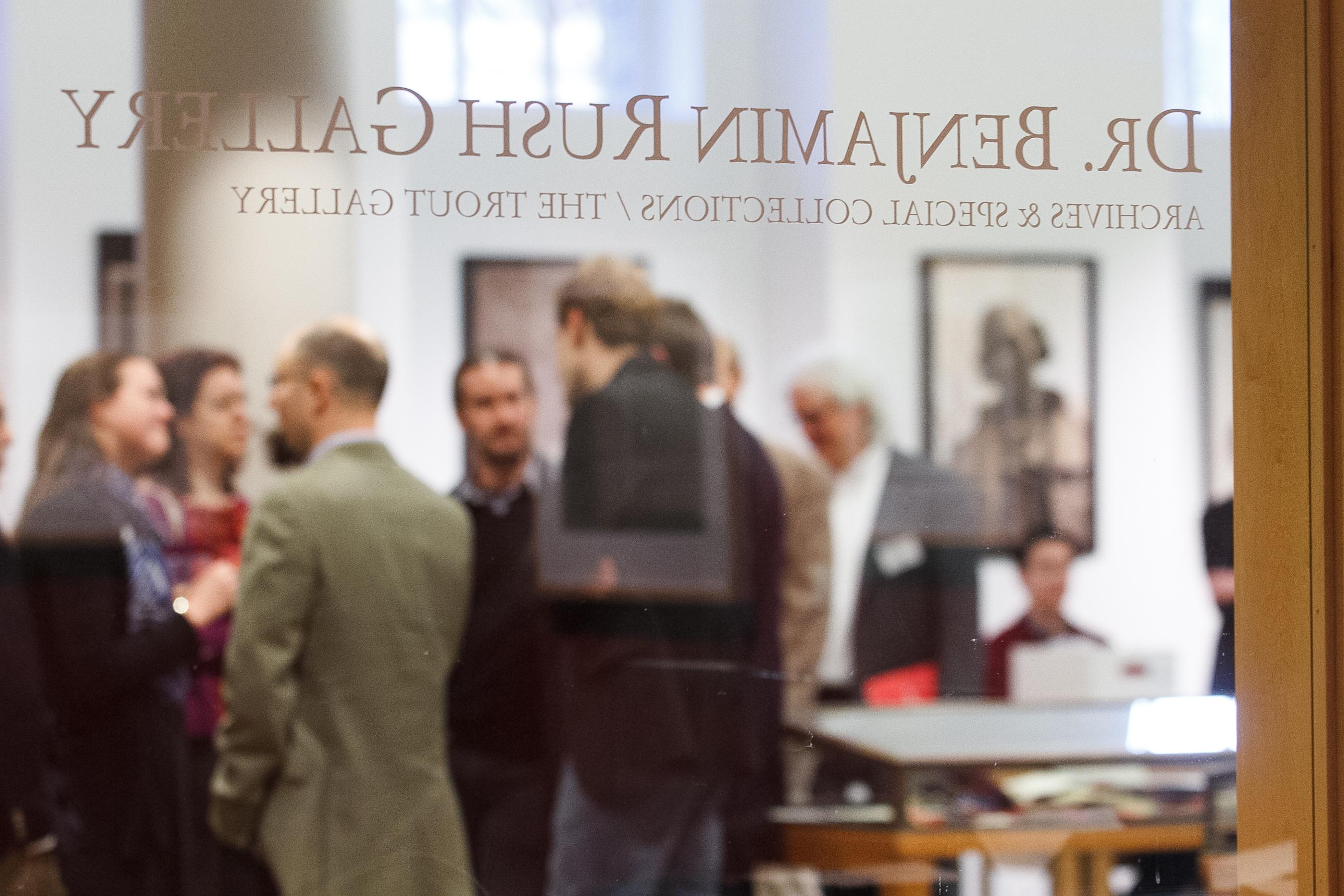A Rush of Contradictions

Participants in The Republics of Benjamin Rush conference take in the new Archives & Special Collections exhibit on Rush, curated by College Archivist Jim Gerencser '93, Special Collections Librarian Malinda Triller Doran and history majors Matthew White '14 and Ariel Caruso '14. Photo by Carl Socolow 77.
Benjamin Rush Conference considers the legacy of Dickinson’s founding father
by Michelle Simmons
He was an abolitionist who was also a slaveholder. He coined the title of Thomas Paine’s Common Sense yet had serious misgivings about direct democracy. Full of optimism about the role of education in the new republic, he founded Dickinson College in 1783; but due to an ongoing feud with President Charles Nisbet, he would lose interest in the fledgling school within a few years.
These tensions between Benjamin Rush the founding father and Benjamin Rush the flawed human were discussed and dissected throughout The Republics of Benjamin Rush conference, held March 20-22 in the Stern Center. The conference was organized by Christopher Bilodeau and Jeremy Ball, associate professors of history, in partnership with the University of Pennsylvania’s McNeil Center for Early American Studies.
More than 50 scholars from top universities and colleges such as Yale, Princeton and Columbia, as well as the University of Cambridge, gathered to share new research on the Early American Republic, with Rush at the center. Panel sessions discussed Rush’s attitudes and writings about abolitionism, politics, friendship, medicine and education. Sophia Rosenfeld, professor of history at the University of Virginia and author of Common Sense: A Political History, delivered the keynote address, Benjamin Rush’s Common Sense, and a roundtable discussion featuring Provost and Dean Neil Weissman closed the conference.
A deeper look
Ball had formed a faculty study group in 2011 to learn more about Rush. Ball also wanted to address some disturbing stories about the prominent Philadelphia physician's views on race, including his notion of blackness as a curable disease—something that Rush believed would actually uplift African Americans.
Out of the study group grew several curricular examinations of Rush, including Bilodeau’s course The New Nation, which focuses on U.S. history, 1780-1840, and includes a close reading of Rush’s essays. The aim all along was to gain a more complete and nuanced view of the man, and the conference was the logical next step and a perfect venue to explore Rush’s contradictions.
“Rush was self-aware enough to recognize the ironies of his position as a slaveholding abolitionist,” said Nina Reid-Maroney of Huron University College, one of the speakers in a panel session called Rush, Slavery and Abolitionism, adding that his antislavery publications were “troubled texts that were a combination of optimism and doubt.”
Similarly, Rosenfeld identified Rush’s ongoing ambivalence and “a growing anxiety about ordinary people engaging in policy.” By 1791, she said, Rush had grown disillusioned with the idea of “common sense” and was sounding more like a French skeptic than a man of the Scottish Enlightenment. Rush’s primary concern? The growing reactionary bent of the crowd, said Rosenfeld, a trend echoed in much of today’s political rhetoric.
Nuanced narratives
As for Rush’s legacy, Weissman laid out a more meta argument, noting that until 1999, hardly anyone at Dickinson knew anything about Rush as a founder of the college. Since then, the college’s intertwining narrative with that of Rush’s has done wonders for its identity as an institution with a venerable past that also continues to look forward.
However, that narrative is complicated by how we view history, “warts and all,” he said. At issue for all historians, he noted, is the picking and choosing of historical facts. “The more challenging—and interesting—question is, what is the legitimacy of applying 21st-century standards to [18th-century] morality and our view of it?” he asked. “What is reasonable to expect or not to expect of Rush?”
Ultimately, what does Benjamin Rush mean for us now? It’s the historical exegesis, an attendee commented, the recognition of a human being grappling with the issues of his day. That’s the useful education personified in Rush. “One of the reasons for this conference is to make sense of it,” said Ball. “It’s to help us figure out how to teach those historical confrontations, the tensions.”
“Obviously Rush means a lot to us,” said history major Robbie Marsden ’15. Marsden had written a paper about the founder in a previous class with Bilodeau and was thrilled to be participating in the conference. “What was of most interest to me, though, is how much of an impact he had on history. The vast array of scholars and historians hailing from distinguished institutions across the country says a great deal about that impact.”
Learn more:
Published April 3, 2014